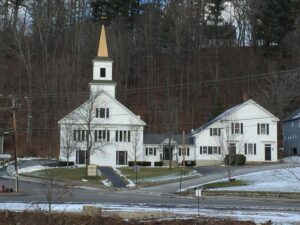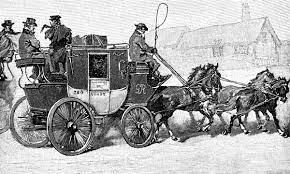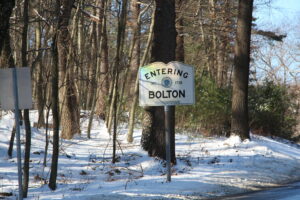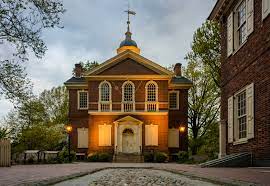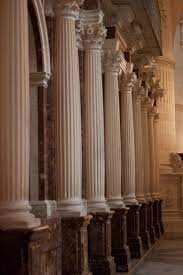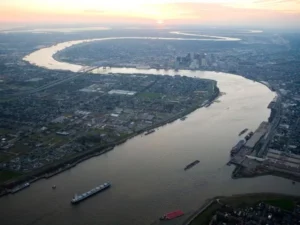Americanism Redux
September 7, your today, on the journey to the American Founding, 250 years ago, in 1773
In New York City, the news is twenty-four hours old. Here and there, clusters of a few people stand and murmur next to cobblestone streets. Then they disappear into the taverns.
They’re talking about the day-old news. Came aboard ship and landed in the newspaper called the New York Gazette.
Yesterday, the sun rose, then the sun set, night had begun, and the news started to spread.
It’s official, the Tea Act is law, enacted by a majority in the British Parliament, and soon 600 chests of British East India Company tea will arrive on other ships, bound for the major towns where appointed officials will oversee its sale and distribution. The colonists are expected to purchase this product that they love to drink, buy it at a lower price than from other competitors who are now outlawed. Public law using public money to mandate a public-private company’s product used by people throughout the colonies. Violators will be punished. That’s the news fit to print in the New York Gazette.
Over there, yes right over there, another small group of people slip into a tavern with newspapers in their hands.
(news first, chests next)
* * * * * *
The news of the Tea Act hasn’t reached the men and women working on the latest pride of Wilton, a village in the colony of New Hampshire. It’ll be days before they hear of it. That’s fine, they’re busy building the Second Meetinghouse of a Congregational Church in Wilton. Gorgeous site amidst the pines of late summer. But then, today, there’s an enormous cracking sound—CRACK!!!!—and the main support post of the structure splits and shatters. It’s been holding up a massive central wooden beam that now crashes down through the smaller rafters and rails, through the bones and bodies of workers who’d been on hammering, chiseling, sawing, and planing. Fifty-three workers are seriously hurt, three are dead, and two more look close to death. It’s a massive building-site disaster.
It’s only been a day since the Tea Act’s first arrival and already there’s a pillar breaking apart.
(the current church in Wilton)
* * * * * * *
Wow, news will be able to travel fast. It’s the first day of a new and rapid method of transportation from Boston to New York City. A stagecoach line has just boarded its first passengers who will travel in only six days’ time—six days!—between the two places. A small group of people climb inside the covered carriage on State Street at the Royal Exchange Tavern. They’ll be in New York City in less than a week and who knows what great things and important information they’ll bring back with them. Hooray for rapid transit.
(newest speeds)
* * * * * * *
The newest landowners meeting in Londonderry, New Hampshire haven’t heard yet about the disaster of the collapsing church in Wilton. Their focus is on approval, just gained today, for them to start a new community in the township of Alexandria, located also in New Hampshire. No doubt at some point soon someone will want to build a church.
(the new township)
* * * * * * *
Other things besides buildings can collapse. In Bolton, in the colony of Massachusetts, there’s a collapse of unity, of consensus, of working together. The Congregational Church in the town is sharply divided over a fundamental issue and there’s no end in sight to their feuding and bitterness. The issue is how to choose and how to remove ministers. Neither side of the dispute has any patience or tolerance for the other. They may have to separate. There was no ear-splitting cracking sound but, then again, maybe there didn’t need to be. The invisible wreckage is visible on the faces of Bolton’s worshippers.
* * * * * * *
Today, workers are carrying boxes and crates up the stairs to the second floor of Carpenters’ Hall in Philadelphia, colony of Pennsylvania. They’re taking the boxes into a large empty room. What’s inside? Books. Lots of books, hard cover, soft cover, no cover. They’re the property of the Library Company of Philadelphia, Benjamin Franklin’s brainchild of the first public library in the colonies, founded forty-two years ago. The LCP is moving into this new space at the Hall.
No one has any idea that a year from now the LCP will be offering use of its books to the “First Continental Congress”, making it the first “Library of Congress.”
(Carpenters’ Hall)
Also
In London, England, near the site of Parliament where the Tea Act was passed back in the spring, a few people gather in a group to discuss an idea and a proposal they hope will catch on. They want to include Ireland in a new union with England. The founder of the Library Company of Philadelphia, Benjamin Franklin, has sent a letter to his son explaining that Ireland’s different regions will be hard to unite and that, anyway, these projects always take much longer than anyone anticipates.
In Madrid, Spain the Spanish monarch approves two new members to the Council of the Indies, an entity founded in 1524 to help with administration of Spanish colonies and settlements in the New World. The pair of members appointed today—Manuel Lanz de Casafonda and Jose Pablo de Aguerro—are experienced in what is called “American affairs.” Their selection is part of a renewed effort to make the Council more relevant, meaningful, and effective in decision-making for colonial policy. The Spanish monarchy believes this is a crucial step for imperial rule.
And on the island of Huahine in the southwestern Pacific Ocean, what the British call Polynesia, a native man called Mai communicates to explorer James Cook his desire to join Cook’s ship Adventure in its trans-oceanic journey.
No one in London has any idea that, on a day in the future, Mai will be the first native of his lands to see England.
(Huahine, Mai’s first home)
For You Now
When the main support beam breaks, it all crashes down.
But why? What is it that actually causes the crash and makes the break?
Was the pillar faulty to begin with, of poor material?
Did something happen to weaken it from within as time went on?
Was it strong but not right, not the proper choice from the start, asked to do the thing it couldn’t do?
Was it used or situated incorrectly and, had the proper steps been taken from the first, would have performed well?
Was it our error on the whole, the entire plan badly conceived?
And perhaps most importantly of all, how do to it better next time? How to ensure that the rebuild is the best build?
Look above at our stories. They are of holding together and coming apart. They are of new places and faces and spaces. People are doing, thinking, feeling, sensing. From all of it comes events and from events emerge actions and reactions. It is today, 250 years ago and a great River turns direction.
(which one?)
Suggestion
Take a moment to consider this: what pillar among us as Americans is the one that is crucial, the one that must stay standing?
(a river turning)

